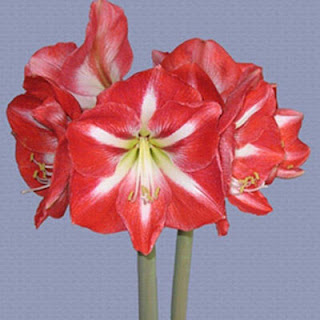 |
| Courtesy: University of Minnesota Extension |
Have you tried growing an amaryllis bulb for the Holidays? Whether it’s your first bulb or your tenth, there is always lots of anticipation waiting for the beefy bulb to produce a flower - easy and fun to do.
Amaryllis flowers range in size from around 6-10 inches and can be either single or double in form. The size and condition of the bulbs will influence their performance. There are many colors to choose from: red, pink, orange, salmon to name a few.
Selecting the bulb:
1. Pick the largest bulb available for the variety you choose. The larger the bulb, the more flowers it will have.
2. Make sure they are firm and dry with no signs of decay or injury. It is common to see new growth emerging from the bulb.
2. Make sure they are firm and dry with no signs of decay or injury. It is common to see new growth emerging from the bulb.
Selecting your container:
1. Amaryllis grow best in narrow containers and can be plastic, metal, ceramic or terracotta. It should be approximately 1 inch wider than the widest part of the bulb and twice as tall for good root development. Just make sure your container has at least one hole in the bottom for good drainage.
2. Fill your container about half full with new potting soil – high inorganic matter, such as peat moss. Place your bulb so the roots rest on the potting soil. Add more soil, tapping it down around the bulb. The bulb should be planted so that 1/3 to ½ of the bulb is above the soil surface.
3. Thoroughly water your bulb so the soil is moist and allow it to drain completely.
2. Fill your container about half full with new potting soil – high inorganic matter, such as peat moss. Place your bulb so the roots rest on the potting soil. Add more soil, tapping it down around the bulb. The bulb should be planted so that 1/3 to ½ of the bulb is above the soil surface.
3. Thoroughly water your bulb so the soil is moist and allow it to drain completely.
Caring for your bulb:
1. Place your bulb container and saucer in a sunny window until the flower buds have begun to open, then move it out of direct sunlight to prolong the life of the flowers.
2. Water when the top 2 inches or so feels dry and allow it to drain completely. Not allowing it to drain can lead to bulb and root rot, also it may attract pests.
3. Once you see new growth emerging, use a houseplant fertilizer at half strength to promote blooming. Fertilizing an amaryllis bulb that has no leaves can kill the roots.
Ready to get and plant your bulbs?
1. Place your bulb container and saucer in a sunny window until the flower buds have begun to open, then move it out of direct sunlight to prolong the life of the flowers.
2. Water when the top 2 inches or so feels dry and allow it to drain completely. Not allowing it to drain can lead to bulb and root rot, also it may attract pests.
3. Once you see new growth emerging, use a houseplant fertilizer at half strength to promote blooming. Fertilizing an amaryllis bulb that has no leaves can kill the roots.
Ready to get and plant your bulbs?
Resources used (also has information if you want to save your bulbs for next year).







